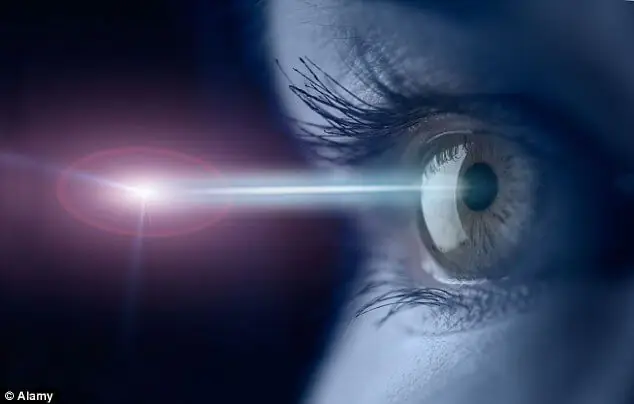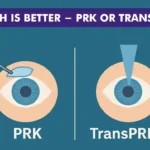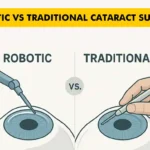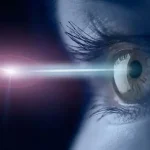Glaucoma is a condition that causes harm to your eye’s optic nerve and gets worse over time. It with a buildup of pressure inside the eye; sometimes, it tends to be innate and may not show up until later in life. The increased pressure, called intraocular pressure, can damage the optic nerve leading to slow loss of vision, which if gone undetected, can lead to complete loss of sight. For the reason that most people with glaucoma have no early symptoms or pain from this increased pressure, it is essential to see your eye doctor regularly so that glaucoma can be diagnosed early and treated before lasting visual loss occurs. How Does Glaucoma Cause Irreversible Damage to Your Sight
- Our eyes have a space in front, which is known as the anterior chamber. A fluid called aqueous humour flows in and out of this space to nourish the tissues in our eyes. While leaving the eye, the fluid flows out from the open angle where the iris meets the cornea.
- When someone suffers from open-angle glaucoma, the fluid can’t pass easily through the open angle, which leads to a build-up of the fluid in the eye, which then raises the intraocular pressure of the eye. Another type of glaucoma, known as close angle glaucoma or acute glaucoma, causes the angle to completely shut down, which is a severe medical issue and must be treated immediately.
- The increase in the intraocular pressure of the eye leads to retina damage, gradually killing the RGCs (retinal ganglion cells) present in the retina, which is crucial for our vision. As the RGCs keep dying, our vision keeps getting gradually worse, leading to eventual blindness.
- The damage done by glaucoma is irreversible because once the RCG cells are dead, it is not possible to revive them. Since there is no way to transplant a damaged optic nerve, glaucoma remains a disease without a cure and only prevention strategies.
Also Read: मोतियाबिंद इन हिंदी If you are over age 40 and have a family history of glaucoma, you should have a complete eye exam every one to two years. Causes of glaucoma include a blunt or chemical injury to the eye, severe eye infection, blockage of blood vessels in the eye, inflammatory conditions of the eye, and occasionally eye surgery to correct another situation. Glaucoma more often than not occurs in both eyes, but it may involve each eye to a different extent. It most commonly occurs in adults over age 40, but it can also occur in young adults, children, and even infants. For most people, there are usually few or no symptoms of glaucoma. The first sign of glaucoma is often the loss of peripheral vision, which can go undetected until the late stages of the disease. Detecting glaucoma at an early stage is one reason you should have a complete exam with an eye specialist every one to two years. Rarely, intraocular pressure can rise to severe levels. In these cases, sudden eye pain, headache, blurred vision, or the appearance of halos around lights may occur. You should immediately see the doctor if you witness any of these symptoms such as redness in the eye, smoky eyes or tunnel vision. Types of Glaucoma There are multiple forms of glaucoma:
- Primary Open Angle Glaucoma (POAG):
- This is the most commonly found type of disease.
- The drainage system of the eyes gets clogged, and the fluid accumulation leads to increased intraocular pressure of the eye, which leads to damage to the optic nerve.
- Angle Closure Glaucoma In this form of the disease, the angle through which the fluid flows out is either completely blocked or very narrow.
- This type of glaucoma can increase the intraocular pressure very rapidly, as opposed to POAG.
- It is considered a medical emergency and requires surgery as part of the treatment.
- Low-Pressure Glaucoma In this form of the disease, the intraocular pressure in the eye stays healthy, but the optic nerve is still damaged due to other factors.
- Secondary Glaucoma Secondary glaucoma refers to glaucoma that is caused due to some other underlying condition or health issue. Diseases that can cause secondary glaucoma includes eye trauma, cataracts, eye surgery, or tumours.
Risk Factors for Glaucoma Even though glaucoma is mostly considered a hereditary disease and even an inflammatory illness as per new research, here are some risk factors for glaucoma:
- High eye pressure.
- A family history of the disease.
- Thin corneas.
- Optic nerve problems.
- Very severe myopia.
- Diabetes.
- High blood pressure.
- Eye surgery or injury.
How to fight Glaucoma? For people who fall in the risk group of developing glaucoma, all is not lost. If caught early, most of the damage done by the disease can be prevented. Medical experts recommend a healthy lifestyle with enough regular exercise and a nutritious diet. Taking care of your mental and emotional health is also vital when it comes to fighting any disease. Glaucoma TreatmentGlaucoma treatment may include prescription eye drops, laser surgery, or microsurgery. The eye drops either reduce the formation of fluid in the front of the eye or increase its outflow, thereby lowering the pressure. Laser surgery for glaucoma slightly increases the outflow of the fluid from the eye in open-angle glaucoma or eliminates the fluid blockage in angle-closure glaucoma. In microsurgery for glaucoma, a new channel is created to drain the fluid, thereby reducing the intraocular pressure that causes glaucoma. It is vital to know that blindness caused by glaucoma is irreversible, which means that further vision loss can be prevented if detected in time, but the vision already lost cannot be brought back. Glaucoma can be treated if early symptoms are paid heed to, and proper diagnosis is made. Therefore, it is essential to visit your eye doctor regularly for a thorough eye examination.





